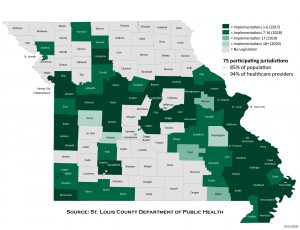
Legislature Acts to Fight Opioids

After a marathon session on Monday, March 9, which went past midnight, the Senate gave initial approval to House Bill 1693 to finally establish a Prescription Drug Monitoring Program (PDMP) in Missouri. Our state is the last in the nation without a statewide PDMP. In 2017, St. Louis County established its own county-by-county PDMP. According to the St. Louis County Department of Public Health, 85 percent of Missouri’s population is currently covered under its PDMP. These monitoring programs are supported by doctors and other health care professionals as an important tool in the fight against opioid and drug addiction. A 2016 survey by the American Medical Association showed that more than 85 percent of physicians agree that PDMPs help physicians have a better understanding of a patient’s prescription history. Over the past several years, I have sponsored legislation establishing a statewide PDMP in Missouri. This year, Sen. Tony Luetkemeyer from Platte County took up the charge and sponsored the legislation in the Missouri Senate.
PDMPs allow doctors to check a patient’s prescription history prior to writing a prescription for a controlled substance. I believe access to this information helps our health care professionals make informed decisions and cuts down on “doctor shopping,” the practice of obtaining multiple opioid prescriptions from a variety of doctors. In my opinion, the opioid epidemic has caused states to speed their adoption of PDMPs, and I would like to see Missouri finally catch up to the rest of the nation on this front.
House Bill 1693 establishes the Joint Oversight Task Force for Prescription Drug Monitoring that will contract with a third party vendor to maintain patient controlled substance prescription dispensation information. In addition, the bill contains several important privacy protections:
- Information contained in the database will be deleted after three years
- HIPAA regulations will also apply to PDMP data
- Patients may receive their own data upon request
- No data from the PDMP may be used to deny Second Amendment rights
I believe these privacy protections helped the bill gain enough support to pass the Senate this week, and I am hopeful the bill will soon be on its way to the governor’s desk. Governor Parson, a former sheriff, has been a longstanding supporter of PDMP legislation.
The opioid epidemic and prescription drug abuse has sadly been a longstanding problem in our area. I have fought alongside law enforcement and health care professionals for legislation to combat meth, opioids and other drugs during my entire tenure in the Legislature, and I will continue to do so. After a long evening of debate on this issue on Monday, I was proud to stand with my colleagues on Thursday and vote to send this important legislation back to the Missouri House of Representatives for final approval. House Bill 1693 is another weapon in our state’s fight against addiction.
It is an honor to serve you in the Missouri Senate. Please do not hesitate to contact my office at (573) 751-3678 or by email at dave.schatz@senate.mo.gov if you have any questions or concerns — we are honored to serve you.
